Throughout your D&D experience, you’ll find all of these types of D&D players… I’ll teach you how to deal with them!
In D&D (and in life), you’ll come across many different types of players (or people), and you should know why are they behaving like that and what can you do to help them.
In most cases, the solution is to talk and make them understand that their behavior is affecting the game and the whole party.
Their actions are bringing bad moments to the other players, and D&D is just a game, so everyone should be having fun!
These are 10 Types of D&D Players you’ll find, and how to deal with them!
10.- The Rule Lawyer
“No no no, wait, the PHB doesn’t say that, let me look it up…”
“Um, excuse me, but last week I read on page 196 a quote that says that, for example, if I’m…”
“What?! That monster doesn’t deal 2d8 damage! The Monster Manual says he hits 2d6”
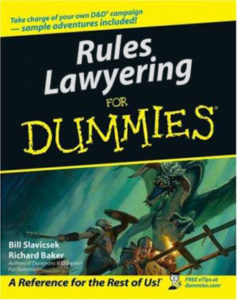
We call “Rule Lawyers” to the players that tend to stop the game or combat just to look for a rule on their Player’s Handbook and make it work in his favor no matter what.
Usually, they’ll argue with the DM for 10 minutes until they hear the DM say “Okay, you’re right” (even if they aren’t).
Rule Lawyers are usually people who don’t roleplay much and focus on minmaxing (that’s why they tend to memorize all the rules/stats).
How to deal with them?
As a dungeon master, there are 2 ways you can run a D&D game: RAW or RAI.
RAW stands for Rules As Written, which means a literal interpretation of the rules.
On the other hand, RAI (Rules As Intended) is how many dungeon masters run their games (the more “logical” way).
To deal with Rule Lawyers, you must impose respect on your table. The DM controls whatever happens in-game and has total authority to modify any rule, as long as it’s consistent throughout the campaign.
Although you must understand that Rule Lawyers are not “mean” or “bad” because they want to, they do it because they don’t want to be mistaken or want to be always right (stubborn, sometimes).
The solution here is to talk with them before the campaign or outside it (via chat, phone, w/e) and explain the problems it causes so it stops occuring.
Another great solution to save time and keep the game flowing is to say something like “okay, we will look up that rule after the game is finished”.
9.- The Evil Character
“Look at me, I’m evil, but I’m not your friend, I’m just here for the money/treasure.”
Evil characters are usually depicted as some kind of dark or obscure magicians (Necromancers or Warlocks)
Often, they want to build an undead army and won’t cooperate just because their backstory says so.
Also, they want to kill everything that moves (even if it’s a friendly NPC).
They don’t want to interact, just take action and be dark/shady. They want to grab everyone’s attention but they don’t want their character to be social.
How to deal with them?
Evil characters are not “banned” or forbidden in D&D, so it’s okay to let a player choose to create one.
However, they must know that D&D is a roleplaying game, where a group of people get together to accomplish something (both, as a group and individually).
Evil characters are hard to handle for both the player and the DM.
To deal with Evil Characters, the whole group should have a Session 0 (zero).
This session is very useful because it lets everybody know how the game will be played as a group. Everybody deserves their own chance to shine, and that should be discussed as a group before starting the campaign.
While I consider that Evil Characters are annoying, they can create a whole different game experience and be super fun, if everybody else is having fun too.
Note: Being evil doesn’t mean that you should kill everybody, it means that your nature is evil but you still MUST cooperate with your gaming group.
8.- The Beginner / Noobie
“What can I do?”
“Uhh… where’s my damage?”
“Which one is the d10?”

We’ve all been here!
D&D is a simple but complex game. It all depends on the person’s background.
It certainly can be played by anyone but some people have more ease learning how to play it.
The Beginner is just a stage that every player has.
How to deal with them?
TEACH THEM and don’t get angry if they don’t always make the “best” decision (they aren’t that experienced).
Remember you were a noobie too! Remember how hard it was for you the first time you played?
You were infested with many options, races, weapons, classes, spells, feats, etc.
Having so many options available usually causes “option paralysis” (the inability to make a decision when presented a wide range of choices)
So, in order to make things easier for new players, the solution is to help or guide them by giving them sample options or limit their choices.
Even though I love the wide array of option that D&D offers you, I tend to run short railroady adventures when I’m dming for new players, since they don’t know much about the game and how it works.
Also, another option can be to limit the choices they get. For example just let them use Humans (no variant), Elves, Dwarves or Halflings; and pick one class between Fighter, Rogue, Wizard, Cleric (no multiclassing).
I know what you’re thinking: “that sucks and will make the game boring”. Well, it will FOR YOU. But not for them.
Once they’ve learned, keep adding content!
7.- The Metagamer
“Okay guys, that’s a Green Adult Dragon, he has 27 AC and a 12d6 breath weapon so be careful!”
“Hey wizard, cast some fire spell, that Troll is vulnerable and you’ll deal more damage!”
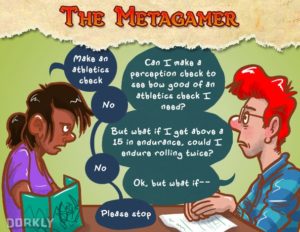
According to Wikipedia, “Metagaming is any strategy, action or method (…) which transcends a prescribed ruleset, uses external factors, or goes beyond the supposed limits or environment set by the game”.
Metagaming in a nutshell: Using out-of-character information in-character.
This ruins the gaming experience for the whole party members. Please don’t do it.
Metagamers want to feel powerful, smart and want to be able to deal a lot of damage and keep their character alive.
How to deal with them?
Personally, I think that punishing a character is a good thing, in this case *evil laugh*
Of course, after the session (if you care about that player), you should ALL speak with him, to let him know that it sucked and ruined the experience for everyone.
One way to “punish” a player is by changing stats. Maybe some Vampires are weak to silvered weapons. Guess what? This one doesn’t.
You get the idea.
The most important thing here is to let those players know that they did wrong and they shouldn’t do it, because, after all, it’s just a game and there’s no reason to cheat.
6.- The Chaotic-Stupid
“I pickpocket the king because I’m a rogue”
“Nah, I don’t roll stealth, I run and shout because I’m a barbarian”
“I join the BBEG and conquer the world”
“I hit him because I have -2 INT”
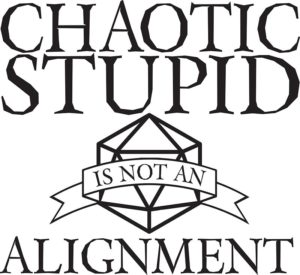
We get it, you’re stupid.
But being stupid doesn’t make that you’ll ALWAYS make stupid and non-sense decisions!
I mean, you can be stupid, but there are some things that of course NOBODY would do because you value your own life and have a survival instinct.
Get it?
It’s okay to roleplay your barbarian with -3 INT, but don’t ruin the game for everybody else.
Of course, your best idea might be to yell and charge the enemy with your battleaxe, but being stupid doesn’t mean you’re also impulsive.
How to deal with them?
Chaotic-Stupid players tend to think that being stupid is being impulsive. They’re stupidly-wrong.
You can give stupid ideas: “Let’s run and charge the dragon”. But you don’t have to be impulsive. Let the smarter players think of a plan and execute it (you can be stupid at the execution, too!)
Chaotic-Stupid players do it for the fun, they think it’s fun to do stupid and non-sense things.
Until they die and have to roll a new character.
5.- The Lucky B#$%ard
“OMG, I crit again. 4 Times in a row, unbelievable.”
“Haha, he has 25 AC and I don’t know how I managed to hit him, I’m only level 5!”
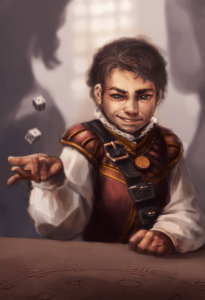
There’s always one Lucky B#$%ard that makes us rage.
Lucky B#$%ards are people who often decide to do something stupid but somehow manage to do it by rolling high and making everybody in the table laugh.
They surprise you, as a dungeon master, and can sometimes wreck your campaign.
But that’s OKAY.
No, really.
You’re playing a fiction game, where magic and sh*t happen all the time. What do you expect?
How to deal with them?
You don’t. Just let them be.
Encourage them to do it more often (so there’s a higher chance they’ll fail and you can laugh at them).
As long as they’re roleplaying and trying to do cool stuff, just let them.
Sometimes the party will kill the BBEG you planned for 2 hours, in 2 rounds, and that’s okay.
Let the dice decide the fate of your campaign. That’s the magic of D&D.
4.- The Cheater
“How did you manage to get so much gold? …Uh, okay, maybe I was wrong”
“Aren’t you dead already? No? Um, ok”
“I thought you had used your potion already? …ok, nevermind”
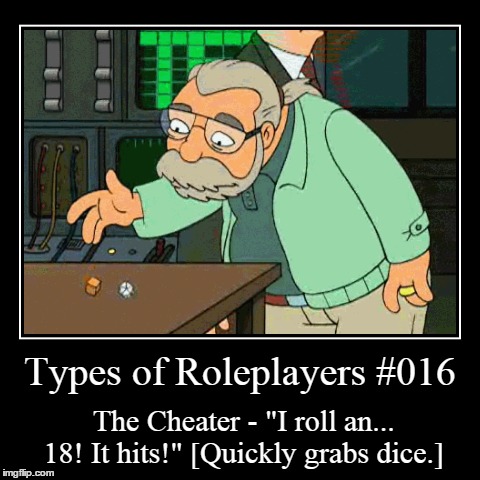
Oh man, this one sucks so much and you and I know it.
If there’s a game, there’s a cheater. Cheating might sound “fun” or “interesting”.
Cheater players are the ones love to change numbers written on their Character Sheet when nobody’s looking at them. Add more gold. Add extra potions. Reduce less health when hit, etc.
Do you want to be invincible?
Do you want to have more gold?
Then, The Cheater is right for you!
NO. NO IT’S NOT.
DON’T.
Cheating is one of the most disgusting things you can do in D&D, if not the most.
It breaks game balance and lets your other party members behind.
This unfairness leads to inequality, and while YOU might feel better, the rest of your party won’t. And it sucks.
How to deal with them?
Cheater’s mentality is quite hard to understand. But it’s based on maturity.
The more mature your players are, the fewer cheaters there should be in your group.
Accepting that your character died or that you don’t have enough gold is good for your personal development. Not everyone has everything in life or D&D.
Again, talking with them after you’ve noticed it should help. You do not need to enforce or punish these players, instead, you want to make them understand and realize that they did wrong and they should stop doing that and enjoy the game!
3.- The Actor
*Dwarvish voice* “Yer’ not strong enough fur’ me! Argh!”
“Behold! I’ve come from distant lands, and they don’t call me Troubadour, the neck-breaker, Lacroix, for nothing!”
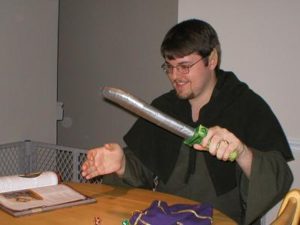
Actors are great! They will help you “set the mood” at your gaming table and will roleplay their character as much as they can.
However, sometimes, they can be annoying!
Actors are the type of players that will show up dressed up as their character. They’ll impersonate them so well that can sometimes exaggerate and would try to steal the spotlight.
They will usually make decisions based on what their character would do, even if that sounds crazy or stupid (backstory)
Different gaming tables have different Actor gradients.
How to deal with them?
Don’t let them steal the spotlight!
I mean, they surely can have it from time to time. But every player deserves their own chance to shine.
Shy players will laugh and think that Actors are cool, but their personality is different and you must understand that, to bring balance to your gaming table.
Even though Actors aren’t a bad thing for you to have at your table, they can bring you some troubles. Your job, as a dungeon master, is to transform those troubles into solutions.
How? Let them “teach” or encourage shy players to be more open and roleplay a bit more.
You do NOT want to force them, just promote the roleplaying climate.
2.- Minmaxer / Powergamer
“I’ll play a Sorlock, multi-target DPS with elemental coverage and familiars”
“18 STR, 18 CON, 18 DEX, 0 INT, 0 WIS, 0 CHA. Yeah, I rolled those stats at home!”

Minmaxers focus on making the most overpowered character without giving importance to roleplaying aspects.
They usually focus (and shine) on combat encounters, and wants to fight a lot to get a lot of XP and level up fast, to be able to keep multiclassing and gaining new feats and stats.
Most Minmaxers tend to multiclass just to “exploit” rules in the books, not because it makes sense to their character.
How to deal with them?
There’s a lot of hate in the D&D community against Minmaxers, because D&D is defined as the greatest roleplaying game (not Wargame).
Minmaxers usually behave like this because they’re competitive and want to deal tons of damage.
Most of them are used to play MMORPGs or online games where they have to take vital decisions on their character, to deal as much damage as possible and win combats.
If you want to get the full minmax experience, go play World of Warcraft, Path of Exile, Neverwinter, etc.
Some players enjoy Minmaxing because it makes them feel powerful, but that’s not a bad thing!
The bad thing is that they’re so powerful, that the rest of the party members feel “useless”.
That’s what YOU should manage, balance encounters, make everybody shine at what they’re good at, and make the game fun for everyone.
You can use homebrew or house rules to “limit” minmaxing (like: you can only multiclass into 1 additional class, etc.)
1.- The Competitive
“I dealt 56 damage and the Wizard only dealt 49!”
“I hit the final blow and tanked the Dragon, that means I deserve a bigger part of the treasure”
“You didn’t even participate in the encounter, you’ve no rights here”

Oh man, Competitive players…
Not only they want to be the strongest damage dealers at the table, but they also want to shove it up in your face and make sure everybody knows that.
They spend the whole session calculating who dealt more damage or who was the most valuable player in a certain quest.
When the rest of the party tries to do something or roll for a certain ability check, they roll too, to see if they can roll higher.
How to deal with them?
This is a bit serious. It all depends on how “hardcore” your Competitive player is.
Talking is a solution here, you just have to explain why their behavior is bad and how it’s affecting the rest of the players.
They could be investing their time into more important things, like tracking Initiative or stuff.
Conclusion
We all have parts of these players in us, the important thing is to be balanced and not 100% dedicated, because it sucks.
The solution is always to talk. Many players do it unconsciously and will try to change when you tell them to.
After all, it’s just a game…
Tell me what type of player you are in the comment section below!
Follow me on Facebook & Twitter to keep in touch and be notified whenever a new post goes live!
Also, if you have any question or would like to add anything please leave me a comment in the comment section down below. I’ll reply ASAP!





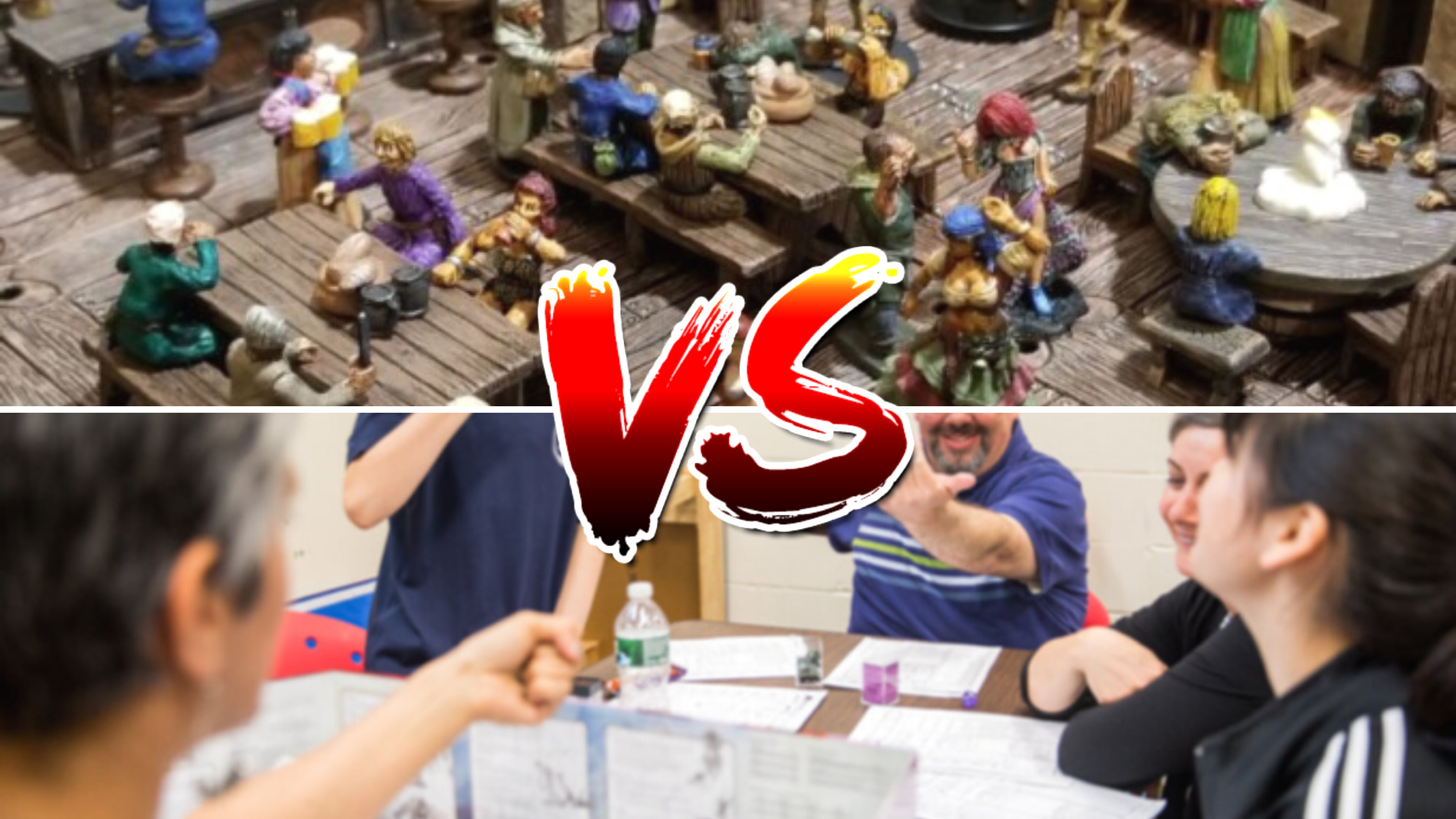
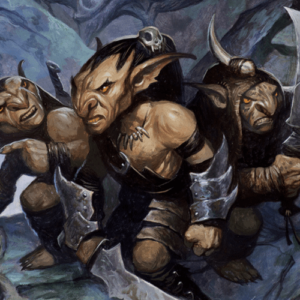
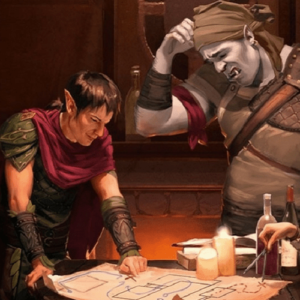
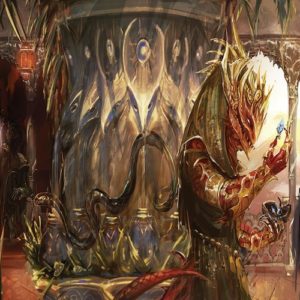
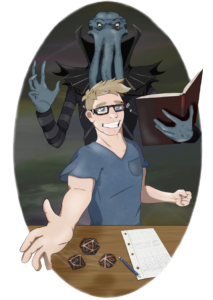
I sincerely have to disagree about Rules Lawyers. Sometimes they’re *right*.
I have a rule that any player can call a one-minute time-out at *any point* if they think I’ve made a bad ruling, and then they have to explain to me why they believe it’s a bad ruling. If I’ve got written backup for my call, then I have a chance to show it. If they’ve got written backup for THEIR position, they need to present it. (They can have more than a minute, the initial minute is only to decide if the rules lawyering is serious or frivolous.)
At the end of the time-out, I’ll make a decision and they have to live with it. However, if it’s later demonstrated that I screwed up badly enough to substantially affect the result, then we’ll either go back to the point of the bad ruling, correct it, and replay the remainder of the battle (much like a baseball game where a protest is upheld after the fact), or, if the error was in favor of the players, we’ll just let it stand with a mention that it won’t work next time. If it was a minor error that most likely didn’t affect the primary result, then I’ll just compensate the player who lost out on the bad ruling. Maybe one “hit” becomes a “miss” and they get some HP back.
I had to do this because I’ve had tables with a GOOD rules lawyer (who only wants to make sure deviations from RAW are intentional) and a BAD one who is always shooting angles, at the same time. I didn’t and don’t want to shut down the friendly rules lawyer because he’s almost always right!